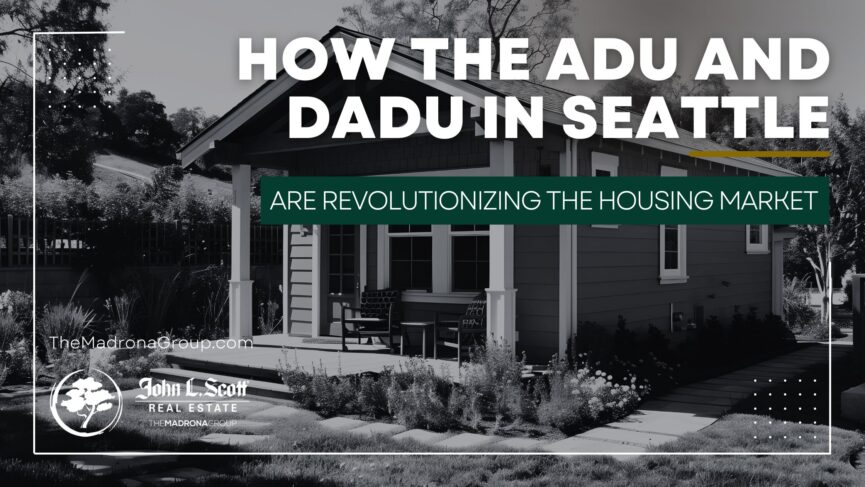Seattle’s housing market has been difficult for both buyers and renters, with the median home price approaching $830,000 in 2024, and rental prices climbing even higher. The city’s housing affordability crisis has sparked a search for creative solutions, and one of the most effective is the development of Accessory Dwelling Units (ADU) and Detached Accessory Dwelling Units (DADU).
One of the more popular strategies is house hacking—using these secondary units to generate rental income and help offset the cost of owning a home in Seattle’s expensive market. House hacking through ADUs allows homeowners to live in the primary residence while renting out the additional unit. For those with a DADU in Seattle, the detached structure provides privacy for both tenants and homeowners.
As more Washingtonians look for ways to make owning a home financially feasible, ADU permits have increased by 60% since 2019, a clear sign that these small units are transforming the housing landscape
What to Expect in This Blog:
- What Are ADUs and DADUs?
- 2024 Zoning Laws.
- Benefits of ADUs and DADUs
- Costs and Financing
- Environmental and Parking Considerations
- Challenges for Homeowners
- Building Your ADU
- Future of ADUs
What Are ADUs and DADUs?
ADUs are secondary housing units that are either attached to or within a primary residence. Common options include basement or garage conversions, which allow homeowners to repurpose existing space for rental income or additional living areas.
DADUs, on the other hand, are independent, stand-alone units, such as a small backyard cottage with its own utilities and living space.
Common Types of ADUs and DADUs:
- Basement ADUs: A cost-effective way to create additional living space without increasing the property footprint.
- Garage Conversions: An ideal solution for homeowners looking to repurpose unused space quickly and efficiently.
- Standalone DADUs: Backyard cottages that provide independent living arrangements and privacy for tenants or family members.
2024 Changes in Washington State Zoning Laws for ADUs and DADUs
Seattle’s new zoning laws have made it significantly easier to construct ADUs and DADUs, thanks to the passage of HB 1337. These regulations aim to encourage housing development, reduce red tape, and make construction more accessible for homeowners.
Simplified Permitting
The permitting process for ADUs and DADUs has been simplified, with fewer restrictions on unit size and faster approval times. Homeowners now have more flexibility when designing their units, as size limitations have been relaxed to allow larger, more functional living spaces.
DADUs and Parking Exemptions
A key update for DADUs is the removal of off-street parking requirements for properties near public transit. This eliminates a major hurdle for homeowners in dense areas and promotes transit-oriented development, which aligns with Seattle’s goal to reduce car dependency.
Environmental Considerations
Seattle’s Environmental Policy Act (SEPA) ensures that DADU construction undergoes environmental reviews, especially in areas where development may impact the local ecosystem or infrastructure. These reviews ensure that projects comply with sustainability goals, minimizing any potential negative environmental impact.
Why DADUs and ADUs Are Popular in Seattle’s Housing Market
With Seattle’s housing costs rising, ADUs and DADUs are becoming popular solutions for increasing housing density and affordability.
Housing Affordability
ADUs and DADUs allow homeowners to generate rental income while increasing the city’s available housing stock. Their smaller size makes them more affordable for renters, offering a solution to Seattle’s ongoing housing crisis without the need for new land development.
Additional Income
Homeowners can benefit from rental income by leasing out their ADUs or DADUs. This extra revenue can significantly offset mortgage payments or property taxes, making homeownership more feasible.
Monthly rental rates for ADUs in Seattle range from $1,500 to $3,500, depending on location and unit size.
Multigenerational Living
DADUs offer an ideal option for multigenerational families, allowing elderly parents or adult children to live nearby while maintaining their independence. The privacy of a detached DADU provides a separate space for family members while staying connected to the primary residence.
Property Value
Adding an ADU or DADU can increase property value by making homes more versatile and attractive to buyers. Homes with rental potential are highly sought after in a competitive market, with properties featuring an ADU or DADU in Seattle often selling at a premium.
Costs and Financing Options for ADUs and DADUs
The initial investment in building an ADU or DADU can be substantial, but there are several financing options available, and the long-term return on investment (ROI) can be strong.
Construction Costs
Building an ADU typically costs between $150,000 to $300,000, while DADUs, due to their detached nature and additional utility needs, can be on the higher end of this spectrum.
Garage conversions and basement ADUs can range between $100,000 to $150,000.
Financing Options
Several financing options are available to homeowners:
- Home Equity Loans/HELOCs: Borrowing against your home’s equity to fund the project.
- Cash-Out Refinancing: Refinancing your mortgage to access cash for the ADU or DADU build.
- Grants: Seattle offers grants to encourage ADU construction, especially for affordable housing units.
ROI
Renting out a DADU in Seattle can generate significant income, making it possible to recoup the cost of construction within 8-10 years.
Additionally, homes with ADUs or DADUs often see a 15-20% increase in property value, making them a smart long-term investment.
Parking, Infrastructure, and Environmental Considerations
Building ADUs and DADUs also requires addressing parking, infrastructure, and environmental impact concerns.
Parking Regulations
In 2024, Seattle removed off-street parking requirements for ADUs and DADUs near public transit, making it easier for homeowners to build without worrying about parking space availability. This change promotes sustainable living and supports transit-oriented development.
Environmental Impact
By reducing urban sprawl, ADUs and DADUs fit into Seattle’s sustainability goals. These units make efficient use of existing land and infrastructure, reducing the need for new construction. Their smaller size also means lower energy consumption and reduced emissions, contributing to Seattle’s environmental objectives.
Challenges and Considerations for Homeowners
While ADUs and DADUs offer numerous benefits, homeowners must navigate challenges related to zoning compliance and community concerns.
Zoning Compliance
Homeowners need to ensure their projects comply with Seattle’s setback, height, and design regulations. Failure to adhere to these rules can result in permit denials or costly revisions. Consulting with an experienced contractor or architect is often necessary to avoid these pitfalls.
Community Concerns
Building an ADU or DADU can sometimes raise concerns among neighbors, especially related to increased density or parking availability. Open communication with neighbors and adherence to neighborhood design guidelines can help mitigate these concerns.
Steps to Building an ADU or DADU in Seattle
Planning and Permits
- Initial Planning: Determine what type of ADU or DADU is appropriate for your property.
- Pre-Application Site Visit (PASV): A required site review to ensure compliance.
- Design Plans: Work with a designer to create plans that meet Seattle’s zoning standards.
- Submit Permit Application: Allow 4-8 weeks for the permit process.
Choosing a Builder
Choose a contractor with ADU/DADU experience, proper licensing, and a solid portfolio. Get multiple bids to compare costs and timelines.
Timeline
ADU and DADU projects typically take 6-12 months from planning to final inspection.
The Future of ADUs and DADUs in Seattle
ADUs and DADUs are expected to play an increasingly important role in Seattle’s housing market. The demand for affordable housing will continue to grow, and ADUs and DADUs offer a way to add housing density while maintaining neighborhood character.
Market Growth
As more homeowners recognize the income potential and flexibility of ADUs and DADUs, these units will become even more popular, contributing to Seattle’s overall housing supply.
With incentives for sustainable, energy-efficient development, the market for ADUs and DADUs will continue to expand.
Potential Legal Challenges
Despite their benefits, ADU and DADU expansion may face pushback from community members concerned about density and neighborhood character. Additionally, future changes in tax assessments could affect the financial viability of these projects.
Conclusion
If you’re a homeowner in Seattle, now is the perfect time to explore adding an ADU or DADU to your property. Whether you aim to boost property value, create an additional income stream, or simply make better use of your space, building an ADU or DADU is a smart long-term investment. Start exploring your options today to maximize the potential of your home.
*I am not an attorney, financial advisor, or city planner, and the information provided in this blog post is for educational purposes only. The content is based on publicly available information and personal research regarding ADUs and DADUs in Seattle. For specific legal, zoning, or financial advice, I recommend consulting with a licensed attorney, a certified financial advisor, or your local city planning office to ensure compliance with current laws and regulations.
Share this post!

